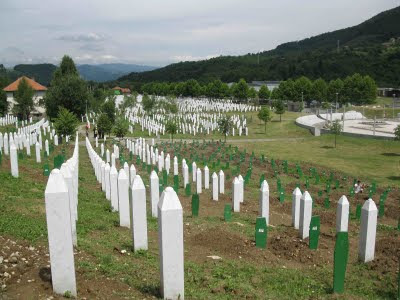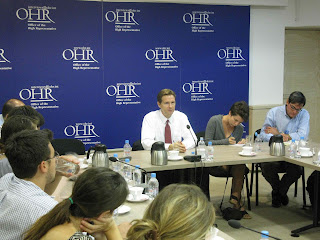Genocide, War Crimes, and Bosnia's search for Justice



On Sunday, we rode nearly 4 hours by bus to Srebrenica, site of the July 1995 genocide against Bosnian Muslims and now a cemetery and memorial to the victims.
After walking among the headstones and the graves of the 8,372-"plus" victims, one of our students, Ali, told me: "you cannot read about this. You can only experience it. You have to be here so you can 'feel it' yourself."
We spent a long time at the cemetery and memorial, including the warehouse across the street from the cemetery. In that abandoned factory, a makeshift museum has been constructed. It consists of maps, pictures, and a timeline of the massacres that befell Bosnians (primarily Muslims) from 1992-95, especially July 1995. And it contains artifacts and personal effects of a large number of the victims.
In these small memorials to individual victims, we can connect with each person: read something about their life, see their picture, and see a small personal item - pocket watch, wedding ring, handkerchief, cigarette case, spiral notebook of a small child.
Leaving the factory/museum, I found all the students and Yiannis sitting around the entrance. Not a word was spoken. We all were stunned into silence, sadness, and sickness (sick to our stomachs) about what we were experiencing this day. We walked back to the bus like emotional zombies. We didn't have time to "process" this experience. We had another 4 hour drive ahead of us to go back to Sarajevo. We stopped in Bratunac (strangely, one of the towns that saw ethnic killings against both Muslims and Serbs). We had to eat something and I asked everyone to simply "grab and go" so we could get away from these horrible places, get back to Sarajevo and "debrief". Well, there were no 'grab and go' options for many of us, so we had to linger longer in Bratunac. Eventually we all got our food and back to Sarajevo we went.
By the time we returned, most people wanted to just go out and enjoy Sarajevo at night. I encouraged that - just go have fun or otherwise get past what we experienced that day, even if it would stay with us forever.
On Monday, we met with a Special Prosecutor and 2 international Judges (both happened to be American) for War Crimes in Sarajevo. We heard from the 2 Americans - one of whom is Philip Weiner, an NU alum (Political Science 1975) - about their work at the Hague (war crimes tribunal) as well as here in Bosnia.
Bosnians need these trials, need to know some type of justice (however insufficient, compared to the mass killings and genocide committed) can be given to them. But we also see that the more Bosnians seek justice for themselves, the more Serbs (in particular) feel the scales of 'Justice' are tipped permanently against them.
It's a horrible imbalance and it's worrisome. Will there be future efforts to "re-balance" the sense of justice and injustice? Will those efforts be violent or will there be efforts through ballot boxes or non-violent campaigns for human rights?



Comments
Post a Comment